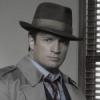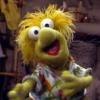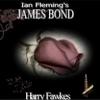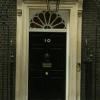Maybe, but in other cases, very prominent cases, Deaver-Bond noly succeeds in his mission because other character - like Osborne-Smith - are idiots.Not that I'm a defender of Carte Blanche, but isn't it a bit unfair?
Granted, DeaverBond sometimes acts in a silly way, but if memory serves, he does figure out by himself the Boots riddle, and bluffs/outwits Dunn, does some real undercover work to infiltrate Hydt's entourage, and uses cleverly Hydt's assistant to get something in that allows him to finally save the day, etc.
If anything, I'd say DeaverBond is probably cleverer than FlemingBond.
Do you think Jeffrey Deaver did Bond justice?
#31

Posted 25 June 2011 - 12:20 PM
#32

Posted 25 June 2011 - 12:21 PM
I'm not a fan of the whole Overseas Development Group replacing MI6. Again, didn't Gardner put Bond into 'COBRA' or whatever it was called? To be honest, I wasn't expecting a re-boot with a younger Bond and I was hoping for a 40 year-old Bond who had been trasplanted into the modern world. Probably too similar to what Gardner did with "Licence Renewed". And yes, it does seem that the continuation novels follow the film formula more than the book formula, but I can't help but think that these authors were/are all hoping that the film rights to their books will be picked up.
And who knew that Bond was a big Formula 1 fan? And I'm not crazy about the invented cocktail "that he hasn't got a name for yet" tidbit. Is he a spy or a bartender? I know times are still tough in the UK, but he's not working somewhere else part-time, is he?
It seems that Deaver has tried to put his own stamp on the character whether he's a fan or not. And while the word 'disrespectful' may be much too harsh, it does seem to me that Deaver took a few too many liberties with the mythology of the character.
And don't even get me started on that twee little "Mary Goodnight's resemblance to Kate Winslet" thang. Or the whole 'Steel Cartridge'/ Bond's father suspicion.
Don't get me wrong. I'm enjoying this book more than Faulk's effort (or maybe I'm enjoying the idea of a new Bond book). But Deaver is throwing me newly-created aspects of Bond that I never knew. I hope it doesn't end with Bond going to Thailand to get a sex change, or something.
#33

Posted 25 June 2011 - 12:50 PM
Maybe, but in other cases, very prominent cases, Deaver-Bond noly succeeds in his mission because other character - like Osborne-Smith - are idiots.
Not that I'm a defender of Carte Blanche, but isn't it a bit unfair?
Granted, DeaverBond sometimes acts in a silly way, but if memory serves, he does figure out by himself the Boots riddle, and bluffs/outwits Dunn, does some real undercover work to infiltrate Hydt's entourage, and uses cleverly Hydt's assistant to get something in that allows him to finally save the day, etc.
If anything, I'd say DeaverBond is probably cleverer than FlemingBond.
Ah, well, I found the Osborne-Smith rather unnecessary.
But arguably, Bond also almost fails in his mission because other characters are idiots (like Osborne-Smith and the Serbian officers). Bond also makes some pretty idiotic moves all by himself.
#34

Posted 27 June 2011 - 07:31 PM
In the interest of full disclosure, I'll confess that I'm only two-thirds of the way through Carte Blanche, but unless the last third is radically different than what I've read so far, I do feel as though I "have a handle" on Deaver's Bond...and I'm enjoying him very much, particularly after spending the better part of last year wading through some of Gardner's sorry efforts, like The Man From Barbarrosa and Benson's screenplays masquerading as novels.
I find Deaver's Bond to be very close, both in personality and in those private thoughts that we're permitted to know, to Fleming's Bond. Not only the small, peripheral things like how he likes his eggs cooked or what kind of liquor he prefers, but his anger and impatience with stupid or boring people, his (I don't think too strong a word) daydreams about a committed romantic relationship (as we see in practically all of the Fleming stories), and more.
My greatest hopes for the last third of the book: (1) That Deaver doesn't spend a couple of chapters describing a golf or card or mah jong game in which Bond is engaged, with a painstaking description of each move and an explanation and commentary on every rule; that was one thing both Fleming and Gardner liked to do that bored me to tears. (2) That Bond is alone, possibly wounded, at some point, in enemy territory, and has to fight his way out against overwhelming odds and hostile forces. Neither the presence of the first scenario or the absence of the second would be a deal-breaker or -maker for me, however.
Actually, there is one more item on the wish list, but I don't think it likely: for that recycling machine to get another crack at Felix Leiter, and win this time... How many were sure, as I was, when that scene popped up, that a trash compacter was going to be doing the work of a shark this time?
#35

Posted 28 June 2011 - 08:36 AM
LOL. But there lies the rub.
But in any case, to quote Blofeld in THUNDERBALL (Eon): my expectations of Deaver were considerably higher.
Wasn't that the case with Devil May Care?
We all got fooled into thinking we were going to get writing like Amis, Pearson and Wood (who all could have had "writing as Ian Fleming" daubed onto their Richard Chopping* covers).
"Writing as Ian Fleming" could never have meant, literally, that. All it was was billing matter, marketing hype. Bond books sold, in large quantities (at least in the UK). The Bond literary brand was restored and, hopefully, Deaver will do for 007 in the US what Faulks failed to do.
I understood the "writing as Ian Fleming" to be how he went about the task - much reported stuff about banging out a couple of thousand will-this-do words and then going for a swim and having a few drinks. Book certainly comes across as the sort of bored slapdash approach one would have suspected of Fleming had he lived to churn another one out. Still, "behaving like Ian Fleming" may have been a better description. It's "writing AS not "writing LIKE" and, although it's very, very easy for me to write this now, I wasn't within the "we were all fooled". It was an authorial vanity, a failed in-joke.
It was a thrill for me to see LitBond take centre stage for a bit. It's thrill for me to see people - "civilians" - reading Bond. It means people will revert to Fleming at some point and that we may have a chance of another truly great Bond novel in the future, provided the literary brand is kept alive. It's about hope, not hype.
Yes, but if they go from Carte Blance to (say) The Man with the Golden Gun or From Russia with Love, they're going to have a bit of a nasty shock. If they go from Carte Blanche to Licence Renewed they're going to have a nasty shock too. Very different lead character (in that there is one).
I just think modern publishing and the need to sell books outside a hardcore of LitBond fans means those in their Fleming foxholes will ALWAYS be unsatisfied. I suppose some are doomed to keep bumping their head on the goldfish bowl of disappointment.
BTW, in my experience, a surprisingly large number of critics and the literati (and Bond fans!) have never actually read a single Fleming book - let alone any, if ALL, the continuation books. A surprisingly large number rely on the inaccurate Wikipedia digests which can pollute opinions and arguments.
That may well be so, and they've got my money now and I am merely typing on the internet. They win.
However, if one just accepts that from 1981 onwards, LitBond is a different thing, disappointment can be tempered. As difficult as it is to accept, the cod Fleming on these boards (good as it is) is perceived to unpublishable in today's market. The bottom is falling out of the publishing world which, like all entertainment industries, remains a precarious profession where, for all the focus groups, research and bribing of buyers, NOBODY KNOWS ANYTHING. Not fair, I know, but just the way it is.
Good title, Nobody Knows Anything. Don't disagree with any of that, save that I would say that the 2011 Bond is markedly different from the 1981 Bond too - although that's probably not that much of an onservation as that was intended to be updating not redating.
If more realistic expectations would be brought to bear on any LitBond endeavour, we may be less disappointed. We'd read Lee Child writing as John Gardner writing as Ian Fleming writing as Sapper, expecting enjoyment and finding it. If one goes into new LitBond with arms folded, harumpfing the demise of Ian Fleming, yet again, it will always lead to the same, rather redundant conclusion.
Well, as you say, if the target is the high level one, to get Bond back on the bestseller list, then that's lovely and people should stop whining. Unless they think it isn't really Bond they're reading. This chap comes across as awfully, y'know, secondary modern.
#36

Posted 28 June 2011 - 11:06 AM
LOL, Jim!This chap comes across as awfully, y'know, secondary modern.
How very Alan Clark-ish of you (now, he would have made a great Bond author).
#37

Posted 28 June 2011 - 01:46 PM
Did Deaver do Bond justice? Definitely not. His 007 is too bland and too, well, nice. There are no echoes of the character Fleming created (in spite of all the embarrassing shoehorning-in of Fleming characters like Leiter, Mathis and Ronnie Vallance).
Now, Deaver's Bond is probably more realistic than that of any of the other continuation novelists (the best thing about CARTE BLANCHE is its wealth of convincing espionage tradecraft detail), but that doesn't make him interesting. He still needs to be brought to life with deft characterisation, but Deaver gives us none of this. The character has no charisma, no edge, and nothing to make us care about him or want to read about his adventures. He's Bond in name only.
I absolutely have to agree.
I also have to admit that I became bored by CARTE BLANCHE after the first twenty pages. For my taste, Deaver´s Bond feels as constructed as the villains and the whole plot. Granted, he tries to root everything in reality, and all of it is plausible and well done. But for me it lacks any soul. I was severely disappointed. At times I felt as if Bond were a character in a computer game.
IMO this is the kind of Bond the Craig era would lead to if the insistence on REALITY were driven to the extreme.
#38

Posted 28 June 2011 - 04:02 PM
#39

Posted 28 June 2011 - 04:51 PM
Sadly, the people behind CARTE BLAND seem to believe that their readers are about as sophisticated as a young Liam Gallagher on a stag night.
I felt patronised while reading this book. Here's an example:
The Green Way anthem chilled Bond. Not the words themselves but the configuration: a crescent of stark black metal letters. It reminded him of the sign over the entrance to the Nazi death camp Auschwitz, the horrifically ironic assurance that work would set the prisoners free: ARBEIT MACHT FREI.
Now, is there really any need to write "the Nazi death camp Auschwitz"? Why not just "Auschwitz"? Do the folks behind CARTE BLAND really believe that some of their readers will need to have Auschwitz explained to them? Any adult who doesn't know what Auschwitz was has no business reading a book (even a Bond continuation novel).
Here's another bit that grates:
Osborne-Smith was nodding agreeably. "Ah, but you're not familiar with my background, James, my curriculum vitae." The smile and the smarminess vanished. "I cut my teeth grilling prisoners. In Northern Ireland. And Belmarsh."
The infamous so-called "Terrorists' Prison" in London.
"I've sunned myself in Cuba too," he continued. "Guantanamo. Yes, indeed. People end up talking to me, James."
Now, that clunking explanation of Belmarsh is presumably aimed at Americans who haven't heard of the place (interestingly, it seems to be taken for granted that they'll know what Guantanamo is). I submit, though, that any half-educated British adult who keeps the most cursory eye on the news will have heard of Belmarsh. In any event, Fleming would never have talked down to the reader by explaining things in this way - he'd have just written "And Belmarsh" and left it at that, and if there happened to be any readers who didn't know what Belmarsh was then that was their problem. What's more, Deaver is writing in an age when an internet search can explain Auschwitz or Belmarsh in a couple of seconds, and most probably on the self-same Kindle or e-reader or tablet or whatever that the reader is already using to read CARTE BLAND.
Fleming writes with a man-of-the-world authority that he also credits his readers with. Deaver and co. appear to credit their readers with little basic intelligence. Reading Fleming, it's almost as though one is flattered to be hearing the Bond adventures as narrated over drinks by old Ian in his clubland drawl. One thus feels as though one has been invited into the sophisticated world of Fleming and Bond. Reading Deaver (and other Bond continuation novels), one has no such warm, fuzzy, slightly superior feeling of being included - one feels as though the author is constantly staring at one with a quizzical frown, as though to say "Is this all too difficult for you to understand? I wonder whether you need me to tell you what 'curriculum vitae' means? If I mention the name of a well-known British prison, are you likely to know what I'm on about?"
Consider the following line: And so at ten o'clock last night the rangy tentacles of these events had reached out and clutched Bond, who'd been sitting in an exclusive restaurant off Charing Cross Road with a beautiful woman, whose lengthy description of her life as an under-appreciated painter had grown tiresome.
What's wrong with this picture? Just that it's too prosaic and too cold. Fleming would have named the restaurant but avoided explaining that it was a restaurant. He'd have just written "Bond, who'd been sitting in the Ivy" (or whatever) and left it at that. If the reader doesn't know that the Ivy is an exclusive restaurant, then tough.
The continuation novels are not Fleming. They never have been, never will be, never can be and never should be. But I do firmly believe that they ought to be as good as Fleming in their own way, and I fail to see why this should be asking for the moon, especially as IFP now appears to be paying top dollar for A-listers like Deaver and Faulks.
However, even Fleming's "unfinished" THE MAN WITH THE GOLDEN GUN feels less raw and more vibrant than just about anything served up in the world of LitBond since his death. It seems to me that Eon has always taken rather more time and trouble over the continuation Bond films than IFP has done over the continuation Bond novels. Like the Bensons and DEVIL COULDN'T CARE LESS, Deaver's offering reads like a first draft that's several months of revision away from being ready for publication.
#40

Posted 28 June 2011 - 05:43 PM
#41

Posted 28 June 2011 - 05:50 PM
...
Splendid post. Nothing to add.
#42

Posted 28 June 2011 - 07:46 PM
I was a bit puzzled as to why in Carte Blanche we are given the waiters name "Aaron"? It didn't make the scene anymore descriptive by doing so.
#43

Posted 29 June 2011 - 07:22 AM
Fleming writes with a man-of-the-world authority that he also credits his readers with. Deaver and co. appear to credit their readers with little basic intelligence. Reading Fleming, it's almost as though one is flattered to be hearing the Bond adventures as narrated over drinks by old Ian in his clubland drawl. One thus feels as though one has been invited into the sophisticated world of Fleming and Bond. Reading Deaver (and other Bond continuation novels), one has no such warm, fuzzy, slightly superior feeling of being included - one feels as though the author is constantly staring at one with a quizzical frown, as though to say "Is this all too difficult for you to understand? I wonder whether you need me to tell you what 'curriculum vitae' means? If I mention the name of a well-known British prison, are you likely to know what I'm on about?"
Quite right.
And for what its worth, the more positive reviews of Deaver come from the American CBNers (who may, or may not, also be a little younger) and the less enthused one's from us old Brits.
Make of that what anyone will.
#44

Posted 29 June 2011 - 08:24 AM
...
Splendid post. Nothing to add.
Agreed. Also summed up with
“In hard covers my books are written for and appeal principally to an “A” readership, but they have all been reprinted in paperbacks, both in England and in America and it appears that the “B” and “C” classes find them equally readable, although one might have thought that the sophistication of the background and detail would be outside their experience and in part incomprehensible.”
Ian Fleming, letter to CBS, 1957
“I write what is referred to as ‘commercial fiction’. I’m convinced that if Casino Royale was delivered to a publisher today, it wouldn’t get published! Publishers want an easy-to-read style when it comes to thrillers, except in the cases they call “literary thrillers” such as Mystic River.”
Raymond Benson, interview with CBn, 2004
"...outside their experience and in part incomprehensible." Hence, one would not need to explain - if you can live without the explanation, you're in on the joke; if you cannot, one's very much afraid you're a bit of a B, or a C. Oh dear.
Does the continuation Bond let those Bs and Cs aspire any more?
LOL, Jim!
This chap comes across as awfully, y'know, secondary modern.
How very Alan Clark-ish of you (now, he would have made a great Bond author).
Exclusive educated, sneered at
Love of outdoor sports
Love of fast driving
Insatiable and ruthless with the opposite sex
Strong sense of duty to a forceful boss
Patriotic yet not averse to criticising the way the country was going
Cruel looks
Oddly sentimental
Fond of the booze
Self-regarding in the extreme
Hypochondriac
Well-travelled
Challenging views on other races
Not a Bond author, but Bond.
Quite right.
And for what its worth, the more positive reviews of Deaver come from the American CBNers (who may, or may not, also be a little younger) and the less enthused one's from us old Brits.
Make of that what anyone will.
Probably goes to show one can mention Emporio Jesse Boot as much as one likes without it being convincingly... damp.
Personally I would be very keen on James Ellroy giving Bond a pop.
#45

Posted 29 June 2011 - 12:46 PM
(Depressing to think there is no mass market for Lit Thrill Bond.)
I think there might be a thread here with suggestions for potential Bond Authors. Wonder if it’s mostly commercial thriller writers suggested?
Edited by Jump James, 29 June 2011 - 12:51 PM.
#46

Posted 29 June 2011 - 01:00 PM
(Depressing to think there is no mass market for Lit Thrill Bond.)
I think there might be a thread here with suggestions for potential Bond Authors. Wonder if it’s mostly commercial thriller writers suggested?
Not sure there isn't.
Oh, there may not be when you have the limited lit skills available of a Raymond Benson, and that forms the basis of RB's opinions. Nor with the skill-set of Jeff Deaver, even.
However, I am convinced that if you could get, ideally, Len Deighton and he knocked out a period Bond piece, or similarly Frederick Forsyth, you could achieve bestseller status and a quality lit Bond that was more than a gee-whiz reboot with limted appeal.
Question really is - have IFP considered that route? Has the Faulks experience burned them totally? Do they have the confidence to try the Deighton/Forsyth approach?
#47

Posted 29 June 2011 - 01:19 PM
Forsyth? Can't fault his research but is it that well written, or at least, is it now? Couple of stunners early on, granted. Seems to now just be a charicature of a splenetic old maggot.
Could all have been much worse: if they wanted big sales British, they could have gone... Archer.
Gulp.
#48

Posted 29 June 2011 - 01:36 PM
There might be.(Depressing to think there is no mass market for Lit Thrill Bond.)
Create the product, and if it is good enough the 'market' will find it.
I am sure we can list film products that didn't start out with a business case or a demographic audience defined. And yet the end product was so glorious, the market found itself.
That said, I'm not sure I can think of one such film. Crouching Tiger, Last Emperor, Seven Years in Tibet - maybe. Thing is of course, these films didn't come with a ~35 film legacy behind it that then shapes what is expected.
#49

Posted 29 June 2011 - 01:45 PM
Deighton; there's an idea.
Forsyth? Can't fault his research but is it that well written, or at least, is it now? Couple of stunners early on, granted. Seems to now just be a charicature of a splenetic old maggot.
I'd probably conceed on your points about Forysth, though I guess two or three early 'stunners' is too or three more than Deaver and his likely successor will have between them... Who knows, a commission to write the next Bond might concentrate his mind and get him back to the ways of old (and, one might add, off some "interesting" political crusades).
I'd also add Gerald Seymour to any list of recommendations. Cracking writer and with possibly a bit more puff in him than Deighton or Forsyth. Of course, he'd most likely give you a top-notch lit Bond entry, but he wouldn't really be known to those poor Americans...
#50

Posted 29 June 2011 - 01:57 PM
Archer I would personally see as a sign that the world is coming to an end. Would even be fitting.
Deighton is mentioned 30 years too late. I suppose his involvement with the Warhead/Thunderball/McClory script may have prevented Glidrose from approaching him prior to the revival of 1980.
#51

Posted 29 June 2011 - 02:01 PM
It’s free market research here with refreshing ideas. Although if most liked it then the future is a little bleak purely form my point of view. How can someone write a fan fiction here at CBn with Bond in the works canteen that rings more true to Bond than CB did?
#52

Posted 29 June 2011 - 05:46 PM
#53

Posted 30 June 2011 - 05:00 PM
My top picks would be Charlie Higson or our very own Jeremy Duns.
If Higson doesn't get a bite of the cherry I'll pack me bags. Don't know where I'd pack em and go to but I'd do it!
#54

Posted 30 June 2011 - 07:56 PM
LOL, Jim!
This chap comes across as awfully, y'know, secondary modern.
How very Alan Clark-ish of you (now, he would have made a great Bond author).
Exclusive educated, sneered at
Love of outdoor sports
Love of fast driving
Insatiable and ruthless with the opposite sex
Strong sense of duty to a forceful boss
Patriotic yet not averse to criticising the way the country was going
Cruel looks
Oddly sentimental
Fond of the booze
Self-regarding in the extreme
Hypochondriac ?
Well-travelled
Challenging views on other races
Not a Bond author, but Bond.
#55

Posted 30 June 2011 - 08:33 PM
#56

Posted 02 July 2011 - 02:31 PM
Not really.
#57

Posted 02 July 2011 - 03:03 PM
Where the book was lacking was on the female side. Hints involving Philly Maidenstone. One scene involving a "willing" partner. As for Bekha Jordaan - probably one of the most irritating leading ladies. (From Bond's point of view, that is.) Deaver was, I think, making a point about the contrast between Bond's way of working and the "by-the-book" methods of policework. Pity the point was made through one of the female leads.
That said, I for one wouldn't object if Deaver wrote a sequel. He seems to admire Fleming's 007 without being starstruck, and I think for a continuation author that's not a bad attitude to take.
#58

Posted 02 August 2011 - 04:00 PM
#59

Posted 07 August 2011 - 05:01 PM
I think you must at least take inspiration from the 50s Bond even if you are not lifting him lock-stock.
No, I do fully agree with you there. What I wanted from Deaver was a young Afghanistan veteran who didn't know one end of a cigarette from the other and would give a puzzled frown if you mentioned the word "Benzedrine", but who would nonetheless have the same personality and "damaged goods" [©Quantum of Solace, 2008] quality of the man from the Fleming novels. The same man-of-the-worldness, the same rigid and often highly questionable views, the same snobbery, the same dark edge, etc.
I know, I know, this is a hugely tall order, but it's what I'd expect of someone like Deaver, a well-rewarded novelist who's been around the block a few times (and not only that but also someone who seems to present himself as a Fleming fiend). Heck, there are some CBners who've managed to get a heck of a lot closer than Deaver with their Bond fanfics set in the modern world - clinkeroo springs to mind.
Gradually I'm arriving at the suspicion that it's equally important for a writer taking on a continuation to be familiar with Kingsley Amis's James Bond Dossier. Amis analyses several elements of the literary Bond and gives a number of clues as to why Fleming and his creation are so hugely attractive to readers and how Fleming played this trick. His main thesis is that Bond, while undoubtedly a heroic character, on each page and within each seperate chapter basically stays not too far removed from the average. Fleming uses a careful balance in the originals that makes Bond never seem larger-than-life or a superhero. Numerous examples illustrate this:
-Bond is the best shot in the Secret Service but he can't beat the arms instructor
-Bond is a tough and relentless fighter in close-quarters, yet he's not looking forward to being thrown around by the commando type who does the training session on Tuesdays
-Bond is a seasoned driver who enjoys driving fast, but he's entirely an amateur (albeit once having 'dabbled on the fringe of the racing world')
And so on. There's a wealth of talents mentioned in the books but each single one is presented in a way that keeps Bond just this side of the fantastic and superhuman. In my opinion Carte Blanche here makes the mistake to present us with an operator who is in each respect so perfect that the ingenius way of describing the ubermensch Bond as if he were average never comes into play. Given some of the more glowing reviews I suspect many readers want just this from their Bond experience, so it's probably exactly what the market expected. It's just not possible for me to enjoy this kind of Bond writing the same way I enjoy the originals.
Is a character "like" the Fleming Bond too extreme now? Not so much the external traits such as the deathly smoking debate, but the tendency towards lethargy and boredom and capcity for mucking up and just fighting his way out etc etc
Why would it be? After all, that's precisely the Bond that Eon and Daniel Craig are currently serving up. It's funny, perhaps, to consider that Bond With An Edge™ is currently to be found in "the movies", whereas the literary series can only offer James Bland.
One crucial question I miss here is Bond's motivation. We've had a discussion recently here about the motivation of the modern film-Bond and I feel that is a thing Carte Blanche - surprisingly - doesn't touch at all.
First of all I think the Bond of Casino Royale may not have had the same background as the one mentioned in YOLT. Despite being the same Bond I suspect Fleming as much grew into Bond as Bond grew into him over the years. In this way Bond's background became ever more detailed with the passage of time until the fictional YOLT-obituary in The Times took shape. Nonetheless it seems a fair assumption that Bond's basic incentive and motives haven't changed as such but merely adjusted to the time Fleming envisaged him.
This obituary states that Bond volunteered at 1941 (let's forget about FRWL's obviously false SMERSH intelligence claiming Bond entered the Service in 1938) and I think this is a crucial detail that reflects more of Bond's character than the bare facts suggest. 1941 was the height of World War II and the fate of countless nations depended on the way that war would turn out. Practically nobody in Europe was unaffected by this war, nearly everybody saw its effects in one form or other, nearly everybody was connected to the war effort, either in the services in the field or at the home front. And sadly almost everybody had lost some relative, lover or friend in the war already, or would soon lose. On top of millions without shelter or home.
Bond volunteering in this situation does not in fact implicate he was a 'natural' soldier or military character (he'd have been drafted a bit later anyway). Thousands of young lads did the same, they just didn't end up with the commandos, SOE or MI6 (it's not given in the obituary where exactly Bond did end up, but a reasonable guess would be one of the above, based on his talents and languages). Throughout the Fleming books Bond always is depicted as being familiar with certain military/commando tactics, yet he never has a military - or more specific naval - air himself. Bond is a civilian who happened to serve during the war, that's it. Fleming mentioned the rank only with his third book (the original manuscript supposedly even mentions a 'Colonel Bond' instead of the 'Commander' so Fleming wasn't sure about giving Bond his own background at the start) and I believe in most of his books it's only used when Bond is introduced by M to an outsider. Bond never uses it himself if I'm not mistaken.
[Given this I'm somewhat surprised how some of the reviews of Carte Blanche praise the inflationary usage of 'Commander Bond' in the tale. It's one of the things that ring the most hollow and wrong to me. Even a modern Bond should not mutate to a twit who bothers with his rank.]
Carte Blanche now makes Bond an Afghan War veteran, thereby putting that war on a level with World War II. I think here is something missing, a vital piece of evidence as to why Bond joined and how he came to be with the Royal Naval Reserve. For evidently this time (this Bond) isn't one of thousands, but apparently a career soldier and it's not comprehensible what made him pick up this career and why he didn't stick with it. This Bond's motivation is a mystery and I would actually have preferred if he had been just recruited by the ODG from college.
One other aspect of the original Bond is his solitary character. Bond is a loner with few frieds we never see and don't believe in. If they exist they probably are Jim, Jack and Johnnie. Well, Deaver's version is surely on first name terms with them too, but he also seems to be fairly well connected and has a few buddies outside the bottle. This is something I can't believe in, a sociable Bond busily networking his way to the top of the City and chatting with some yuppie/scuppie/winder-twit about their sexual conquests or escapades.
All in all I'm afraid Deaver doesn't get top marks from me for his version of Bond as yet. I wish there was any kind of potential I could see in the character from the end of Carte Blanche onwards and Jim's suggestion that the infallible Bond could see a major and violent transformation soon seems tempting. But I'm far from convinced that the next book in the series will deliver such titbits.No one's calling for Fleming-foxhole dwellers to be pandered to, though. Indeed, probably the biggest criticism of CARTE BLANCHE on CBn has been its inelegant and gratuitious shoehorning-in of box-ticking Fleming elements and characters (Leiter, May the housekeeper and so forth).
Most people's gripes with CARTE BLANCHE don't seem to revolve around Deaver's handling of Bond (poor though it is) or the book's lack of Flemingian flavour. Most people who are disappointed with it are disappointed because they don't consider it to be a good read on its own terms.
Unless one merely demands a novel with James Bond in it (and there are fans who are satisfied with just that, and there's nothing wrong with that), it's on things like story, characterisation, originality, surprises and excitement that a book like CARTE BLANCHE stands or falls, and for The Haters™ it just doesn't cut it in those departments. Ultimately, that's why it's a letdown (for those of us who view it as a letdown, that is).
I for one wonder why Carte Blanche absolutely had to pick up that cinema pattern of Bond with several different locales. Why not a Bond book sticking with one setting, maybe even a confined one, a Shining-like hotel in the mountains cut from the ouside by a blizzard or some such? An Antarctic island? A British submarine? A quiet Brazilian fishermen's village? An old salt mine?
I must credit myself with starting at least one of the many discussions on the motivations of the 'New Age' cinematic Bond, and so I completely understand this need to understand the 'New Age' literary Bond's motivation. And, in a sense, I do feel Deaver's Bond comes across, in a professional sense, as being pretty much the same as Fleming's Bond, albeit updated to the modern day...in that, Bond is portrayed as being the consummate professional first and foremost.
I agree, there's the issue about Bond's motivation to go to Afghanistan in the first place...one which has to go beyond the 'patriotism' of the 1940's. But then again, there are countless young men who enter military service voluntarily without having some strong ideological motive to do so (apart from a feeling of duty or a conviction that one can do some good in the world)...why can't Bond simply be one of those countless soldiers, albeit one who was qualified and professional to the extent that he was able to 'break into' the intelligence field and enter as exclusive an agency as the ODG?
And I feel that Deaver's Bond is VERY different from Craig's Bond...he isn't doing soul searching, trying to find his purpose in the world as an agent of rigteousness or anything like that...he's just a professional defending the realm (of course the 'Queen and Country' stuff is toned down, so we might as well extend it to the 'free world').
That said, I must say that the ODG in this book overall comes across as being a far more sophisticated and professional organisation than the SIS as portrayed in Fleming's novels...this isn't just a loose assemblage of Civil Servants, ex-Army types and other assorted ameteur spies playing 'Red Indians' and other spy games...but rather a lean and highly effective machine designed to combat terror.
#60

Posted 09 August 2011 - 03:53 PM












